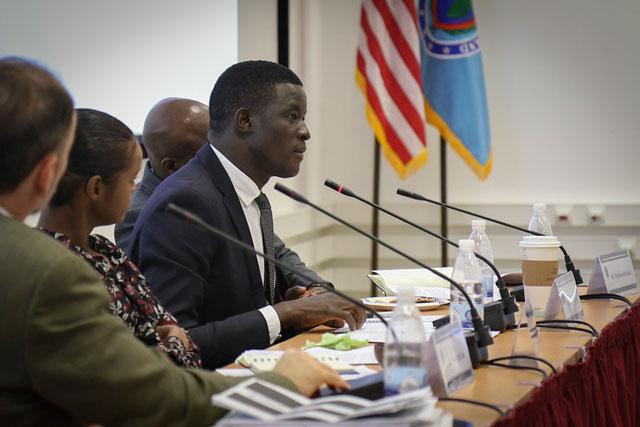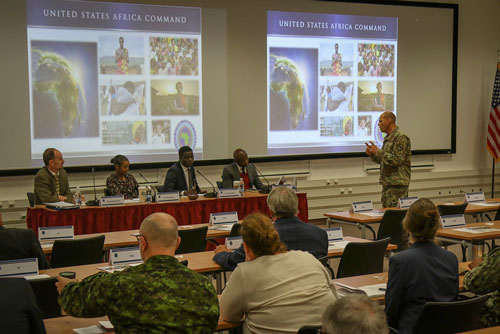
Uganda’s Ochen offers insights on youth, security and peace at AFRICOM meet

Stuttgart, Baden-Wurttemberg, Germany | THE INDEPENDENT | Uganda’s Victor Ochen was recently one of three young leaders from Africa that briefed the United States Africa Command (AFRICOM) on the role youth can play to promote peace on the continent.
Ochen, United Nations Global Goals Ambassador for Peace and Justice and 2015 Nobel Peace Prize nominee from Uganda, spoke about helping youth overcome the traumas of war and organize youth programs with the goal of making wars less common in Africa.
“Let us practice development, let us practice democracy where we can vote our way to power,” Ochen said. “Not kill our way to power, that’s not a goal for this generation.”
Ochen has spent most of his life surrounded by war and uses his experiences for peace building and community development
AFRICOM, in coordination with the U.S. Agency for International Development, hosted the panel of youth leaders in Stuttgart, Germany, Oct. 15, 201 to better understand what the burgeoning youth population means for Africa’s future.
During their visit, the three youth leaders representing Somalia, Cameroon and Uganda offered their experience and efforts in engaging African youth with employees from AFRICOM during morning and afternoon panel discussions.
Meetings were also held with senior leaders from the Command to share how they are working on preventing conflict in their countries and dealing with issues of deradicalization, reintegration, and rehabilitation. They also discussed ways of engaging African youth as a means to promote peace throughout the continent.
The United States Africa Command, is one of the eleven unified combatant commands of the United States Armed Forces, headquartered at Kelley Barracks, Stuttgart, Germany. It is responsible for U.S. military operations, including fighting regional conflicts and maintaining military relations with 53 African nations
“The youth population will more than double by 2050. There will be ~1 billion young people in Africa.”
AFRICOM hosts youth leaders to better understand what the burgeoning youth population means for Africa’s future: https://t.co/FL14vgX4da pic.twitter.com/fjgdFtXS8Y— US AFRICOM (@USAfricaCommand) October 22, 2019
Seated next to me at @USAfricaCommand is 2015 nobel Peace Prize Nominee, @Victor_OCHEN he was the youngest African to ever be nominated for a nobel nomination. My brother, partner in peace & one of the funniest people I know! Onward!!
pic.twitter.com/EXmIuH0fgL
— Ilwad Elman (@IlwadElman) October 15, 2019
The Demographic dividend
Part of the conversation in the meeting, according to a report by AFRICOM, involved current and future demographic projections in Africa.
“The youth population will more than double by 2050. There will be approximately one billion young people in Africa,” said Sheila Roquitte, deputy development advisor, U.S. Africa Command. “Everyone in the world wants the same thing. We all want security; we all want education for our kids; we all need healthcare. We all need the same basic things, and in Africa it’s no different.”
“In my country alone, 78 percent of the population is under the age of 30,” said Ilwad Elman, a 2019 Nobel Peace Prize nominee from Somalia. “And 56 percent of that is under the age of 15. The opportunity exists for governments to engage young people, because the majority are peaceful and want to be part of the process.”
Panelists noted that there is a general perception amongst youth that their voices are not heard in political and governing processes. Elman indicated that the biggest threat to stability in Africa is the systematic exclusion of youth because if they feel they are not heard, they will use other channels to register their dissent.
“Some of the things that came out of the discussions were how violent extremist organizations understand what the youth want – and need – and when nobody else is able to provide that then they will look to alternatives,” said Roquitte.

“It’s part of what we’re trying to do with AFRICOM’s training of local security forces, through the State Department’s interaction at the national policy level and what USAID does on development on the community and national level,” said Michael McCabe, youth coordinator, USAID. “The majority of young people in Africa are intensely interested in being partners in their community’s development, partners in building peaceful solutions in their countries.”
Panelists urged AFRICOM to see youth as positive agents for change and not only as potential perpetrators or victims.
“We have been able to listen to young people, get close to them,” said Christian Achaleke, Commonwealth Youth Peace Ambassadors Network – Africa coordinator, on his time working in prisons in Cameroon to deradicalize and reintegrate violent extremists as a means to promote peace throughout the continent.
The key messages were well received by AFRICOM leadership and staff, Roquitte said.
“With youth as the majority of the population, and if AFRICOM wants to achieve a stable, peaceful and prosperous Africa, the best return on investment will be through engaging youth,” Roquitte said. “This is just the first step in the process.”
*****
SOURCE: U.S. Africa Command AFRICOM
The post Uganda’s Ochen offers insights on youth, security and peace at AFRICOM meet appeared first on The Independent Uganda:.
0 Response to "Uganda’s Ochen offers insights on youth, security and peace at AFRICOM meet"
Post a Comment